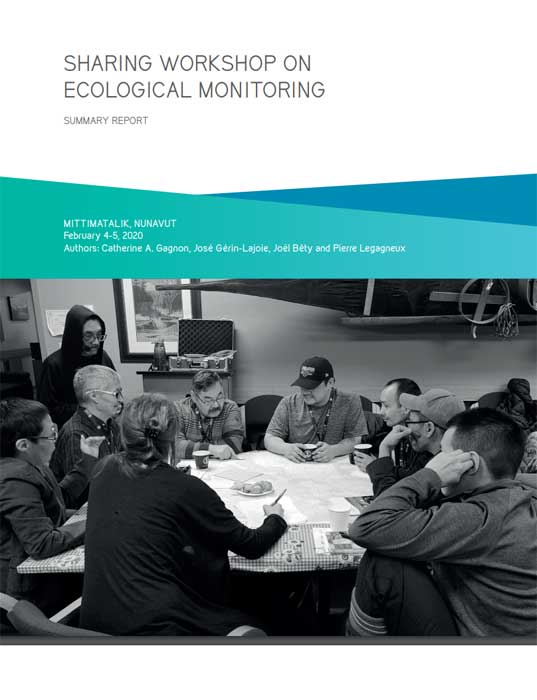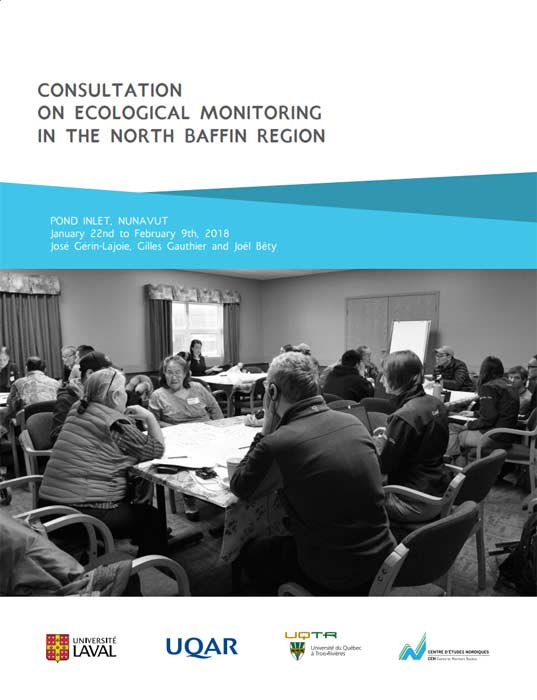At the beginning of the years 2000, researchers working on Bylot Island have realized the necessity to engage more closely with the Inuit community of Mittimatalik (Pond Inlet), whose members have travelled and hunted on Bylot Island for many generations. This engagement was consolidated through an Inuit Knowledge Project about snow geese and arctic fox conducted in collaboration with Elders and Hunters from Mittimatalik from 2004 to 2007, that culminated in an Elders-Youth Camp during which lead researchers interacted more closely with community members. From 2005, and every 2 to 3 years since, lead researchers have made efforts to organize and conduct winter workshops in the community to present their work and have open discussions with community members. These workshops have addressed several aspects of the research conducted on Bylot Island and the surrounding areas, including the research station and projects about wildlife, plants, insects, contaminants and permafrost. Every year, on their way to Bylot Island, lead researchers, have always made efforts to spend time in the community of Mittimatalik to meet less formally with local organizations such as the Hamlet and the Hunters and Trappers Organizations. These meetings have always been the occasion for researchers to discuss their work, listen to local concerns and share perspectives with community members. We present here information on our most recent workshops.
Sharing workshop on ecological monitoring (2020)
The 2020 sharing workshop was a follow-up to previous consultations and provided an opportunity to update the community about ongoing ecological research initiatives in the Mittimatalik (Pond Inlet) area. This event included several face-to-face meetings with local organizations, a one-day workshop and a community ‘open house’ for the general public. All the activities took place in Mittimatalik from 3 to 6 February 2020, with 37 participants attending the one-day workshop and more than 40 community members visiting the open house. Organizations that attended the workshop included the Mittimatalik Hunters and Trappers Organization, the Hamlet of Pond Inlet, the Qikiqtani Inuit Association, Parks Canada (Sirmilik National Park) and their Joint Park Management Committee and Inuit Knowledge Working Group, Environment and Climate Change Canada, students from the Environmental Technology Program of the Nunavut Arctic College, the Government of Nunavut, Ikaarvik and Smart Ice. The objectives of the 2020 sharing workshop were to inform, discuss and obtain feedbacks from local participants and organizations about:
- Conclusions and recommendations that emerged from the broad consultation held in Mittimatalik in 2018 by our research group (see below);
- Actions that were taken by researchers since 2018 in response to recommendations and concerns raised during the 2018 workshop;
- Ongoing ecological research projects and initiatives taking place in the Mittimatalik area with a specific attention to the study of contaminants in bird eggs and carcasses;
- Collaboration between researchers and the community concerning research initiatives and the establishment of a future research station in Mittimatalik;
- Ongoing development of the SIKU mobile application including wildlife observations;
- Community expectations and potential collaborations with researchers concerning the impacts of resources development in the area.
Workshop on ecological monitoring in the North Baffin region (2018)
Following over 20 years of terrestrial ecological studies and monitoring on Bylot Island, researchers working at the Bylot Island Research Station (Goose Camp) wanted to hear the environmental concerns and priorities from the local population in the North Baffin region. They organized a broad consultation on this issue to brainstorm with participants, have open discussion, generate ideas and find ways to work more closely with the communities of Pond Inlet and Arctic Bay. This initiative included six pre-workshop consultations with local organizations and committees followed by a two-day workshop. Activities took place in Pond Inlet from 23 January to 8 February 2018 with 50 participants, the vast majority from northern communities. Organizations that participated to the consultation process included the Mittimatalik Hunters and Trappers Organization, the local Youth Group, the Pond Inlet Hamlet Municipal Council, Ikaarvik, Elders, Parks Canada and their Inuit Knowledge Group and Joint Park Management Committee, the Canadian Wildlife Service and their Area Co-Management Committee, the Qikiqtani Inuit Association and Environment and Climate Change Canada. Participants involved in pre-workshop consultations could individually express their main environmental concerns, share them with the group, and collectively organize and synthesize their ideas in posters. Four main themes emerged from the pre-workshop consultations:
- Natural processes and changes affecting the Land;
- Human activities impacting the Land;
- Freshwater fishes;
- Wildlife on the Land.
During the workshop, participants worked in teams on each of these four themes to develop concrete projects that addressed issues raised during the pre-workshop consultations. Seven projects were developed on the following issues:
- Changes affecting the Land, primarily permafrost thawing, mudslide and coastal erosion;
- Impact of mining activities on water and air quality at Phillips Creek;
- Surveillance of tourist activities (cruise ships, private yachts) with automated cameras;
- Freshwater fish habitat and health;
- Fish migration;
- Health of North Baffin caribous;
- Health of birds and eggs that Inuit consume.
At the end, each team presented their project to the whole group to seek their comments and a survey was conducted within the group to determine the feasibility and benefits for the community of each project. Potential partnership and funding sources for each project were also explored. This consultation should lead to an action plan to address environmental issues that matter to northerners in collaboration with them. The whole process was considered very successful by participants based on an evaluation conducted at the end of the workshop.


